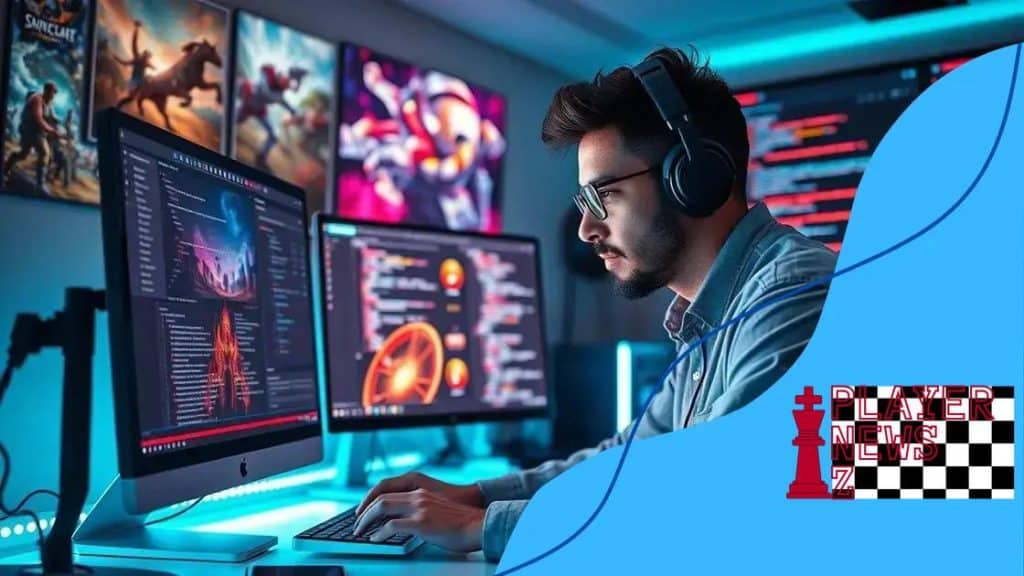AI-powered game development tools are transforming gaming

AI-powered game development tools enhance creativity, streamline processes, and personalize gameplay, revolutionizing how games are created and experienced in an increasingly competitive industry.
Discover how AI-powered game development tools are revolutionizing the gaming industry. With these technologies, developers can enhance creativity and streamline processes, leading to innovative gaming experiences. Have you wondered how they could change your next project?
the rise of ai in game development
The rise of AI in game development has changed how games are created and played. As technology advances, developers are incorporating AI to enhance both creativity and efficiency in the gaming process. This integration allows for the creation of more complex and engaging game environments.
Understanding AI in Gaming
AI technology in games isn’t just about creating better graphics. It involves using algorithms that analyze player behavior and adapt game dynamics accordingly. This personalization leads to a more immersive gaming experience.
Key Benefits of AI Tools
- Enhanced Creativity: AI can generate unique game scenarios and storylines that may not be imaginable by human developers alone.
- Smart NPC Behavior: Non-playable characters (NPCs) become more realistic, reacting intelligently to player actions.
- Streamlined Development: AI tools reduce the time needed for game testing and debugging, allowing developers to focus on creative tasks.
- Data-Driven Decision Making: Developers can analyze player data to make informed decisions about game design and features.
With these advantages, developers are finding opportunities to innovate and create games that resonate with players. AI technology also streamlines the development process by automating routine tasks, thus freeing up time for creativity. Incorporating AI in game design encourages experimentation and allows for the exploration of new ideas.
As AI evolves, its potential impact on the gaming industry continues to grow. The ongoing research and development of AI technologies promise not just better games but entirely new forms of interactive experiences. Exploring the rise of AI in game development helps us understand the future direction of this exciting industry.
key features of ai-powered tools
AI-powered tools have become essential in game development. Their key features enhance creativity and streamline workflows, making them invaluable assets for developers.
Enhanced Creativity
One of the most exciting features of AI-powered tools is their ability to generate content. For example, these tools can create unique landscapes, characters, and storylines, allowing developers to focus on other aspects of the game. This automation not only saves time but also opens up new avenues for creativity.
Adaptive Learning
Another critical feature is adaptive learning. AI tools analyze player behavior and preferences, adjusting gameplay accordingly. This means that developers can offer personalized experiences, making games more engaging.
- Real-time feedback: AI provides developers with immediate insights into how players interact with the game.
- Dynamic difficulty adjustment: The AI can modify game difficulty based on a player’s skill level, ensuring a balanced gaming experience.
- Predictive analytics: AI can forecast player trends, helping developers make informed decisions about game design.
Additionally, AI-powered tools can assist in debugging and testing. By automating routine checks and finding bugs more efficiently, they allow developers to dedicate more time to creative processes. The collaboration between developers and these advanced tools creates a synergy that can lead to innovative game mechanics and enhanced player experiences.
The integration of AI-powered game development tools also encourages collaboration among teams. With better communication and data sharing, teams can work together more effectively to bring their visions to life. The evolution of these tools signifies a remarkable advancement in the gaming industry, where creativity meets technology seamlessly.
benefits for indie game developers

The implementation of AI-powered tools provides numerous benefits for indie game developers. These tools not only enhance creativity but also streamline the development process, giving smaller teams a competitive edge.
Cost-Effective Solutions
One major advantage is that AI tools can reduce development costs. By automating repetitive tasks, developers can allocate resources wisely, focusing on more innovative aspects of their games. This leads to a more efficient workflow without compromising quality.
Enhancing Creativity
AI aids in the creative process as well. Independent developers may have smaller teams, and finding inspiration can be challenging. With AI, these developers can generate ideas for characters, settings, and storylines quickly.
- Improved game design: AI algorithms can suggest design elements based on trending styles and player feedback.
- Unique content generation: Developers can create diverse game environments rapidly, ensuring originality in their projects.
- Real-time adjustments: AI helps in making real-time changes during gameplay testing, enhancing gameplay before the final release.
Furthermore, the collaborative nature of AI tools fosters a creative environment. When developers utilize AI algorithms, they can experiment with various concepts and receive instant feedback. This interaction not only enhances the development process but also motivates teams to push their boundaries.
Utilizing AI-powered solutions can help indie developers stand out in a crowded market. The ability to produce unique and engaging games efficiently is a significant advantage, allowing them to capture the attention of players and focus on their creative vision.
case studies of successful ai implementations
Examining case studies of successful AI implementations in game development reveals the transformative effects these technologies have had on the industry. Various developers have harnessed AI to enhance their games, leading to impressive results.
Example 1: Ubisoft’s AI Playtesting
Ubisoft has utilized AI to enhance its playtesting processes. By implementing algorithms that analyze player behavior, they can identify trends and issues in real time. This allows the team to make improvements early in the development cycle.
Example 2: Electronic Arts and Dynamic Difficulty
Electronic Arts (EA) has successfully implemented AI to adjust game difficulty dynamically. Their system monitors player performance and adjusts challenges accordingly, ensuring that players remain engaged without becoming frustrated. This feature has improved player satisfaction and retention.
- Engagement: Players find the gameplay experience more rewarding.
- Retention: Satisfied players are more likely to continue playing and recommend the game.
- Feedback Loop: The AI gathers data to continuously refine the gameplay experience.
In addition, AI-driven tools like those used by the popular battle royale game Apex Legends analyze player movement and tactics. This data helps developers create more balanced gameplay, allowing them to make targeted adjustments that enhance competitiveness.
By exploring these successful implementations, we see how AI-powered technologies can lead to innovative gaming experiences. Each case illustrates the significant advantages that AI brings to development teams, proving that integrating these tools can lead to more engaging and successful games.
future trends in ai gaming technology
Future trends in AI gaming technology promise to reshape the gaming landscape in remarkable ways. As technology advances, developers will harness new AI capabilities to create even more engaging experiences.
Personalization of Gameplay
One of the most significant trends is the increasing personalization of gameplay. AI will analyze individual player behavior to tailor experiences directly to them. Imagine games that adjust their storylines and challenges based on your playing style and preferences!
Advanced NPC Interactions
Non-playable characters (NPCs) will become even more sophisticated. Instead of following simple scripts, they will use AI to respond to player actions in real time, creating a more immersive experience.
- Realistic dialogue: NPCs can engage in meaningful conversations based on context, enhancing storytelling.
- Diverse behavior: Players will encounter characters that react differently under various scenarios, making the game world feel more alive.
- Adaptive strategies: NPCs will learn from player tactics, offering more challenging encounters.
Moreover, AI will support the development of procedural content generation. This technology creates unique environments and scenarios on the fly, providing limitless possible game worlds. Players will always have something new to explore, keeping the experience fresh.
The utilization of cloud gaming and AI will improve accessibility. Gamers will be able to access high-quality content regardless of their device. This means that even mobile players can enjoy graphically demanding experiences powered by AI.
As AI technology evolves, its impact on the gaming industry will deepen. The combination of personalization, advanced NPCs, and procedural generation sets the stage for a thrilling future in gaming.
FAQ – Frequently Asked Questions about AI-Powered Game Development Tools
How do AI tools enhance game development for indie studios?
AI tools streamline processes, reduce costs, and boost creativity, giving indie studios a competitive edge.
What are some examples of successful AI implementations in games?
Successful examples include Ubisoft’s AI playtesting and Electronic Arts’ dynamic difficulty adjustments.
How can AI personalize the gaming experience?
AI analyzes player behavior to tailor challenges and storylines, ensuring a more engaging gameplay experience.
What future trends can we expect from AI in gaming technology?
Future trends include advanced NPC interactions, procedural content generation, and more accessible cloud gaming options.





